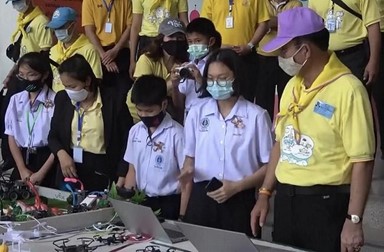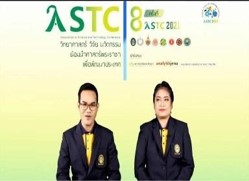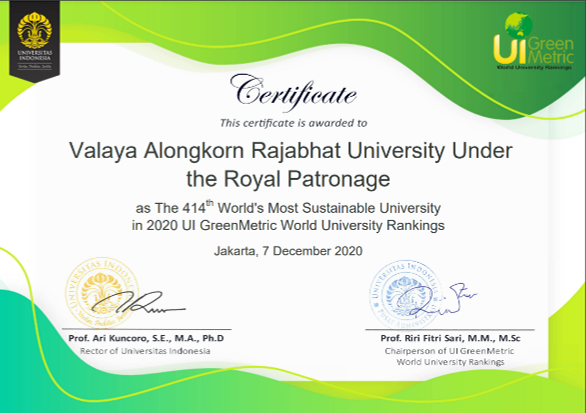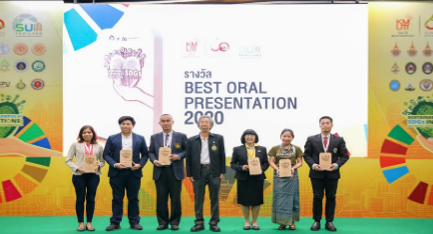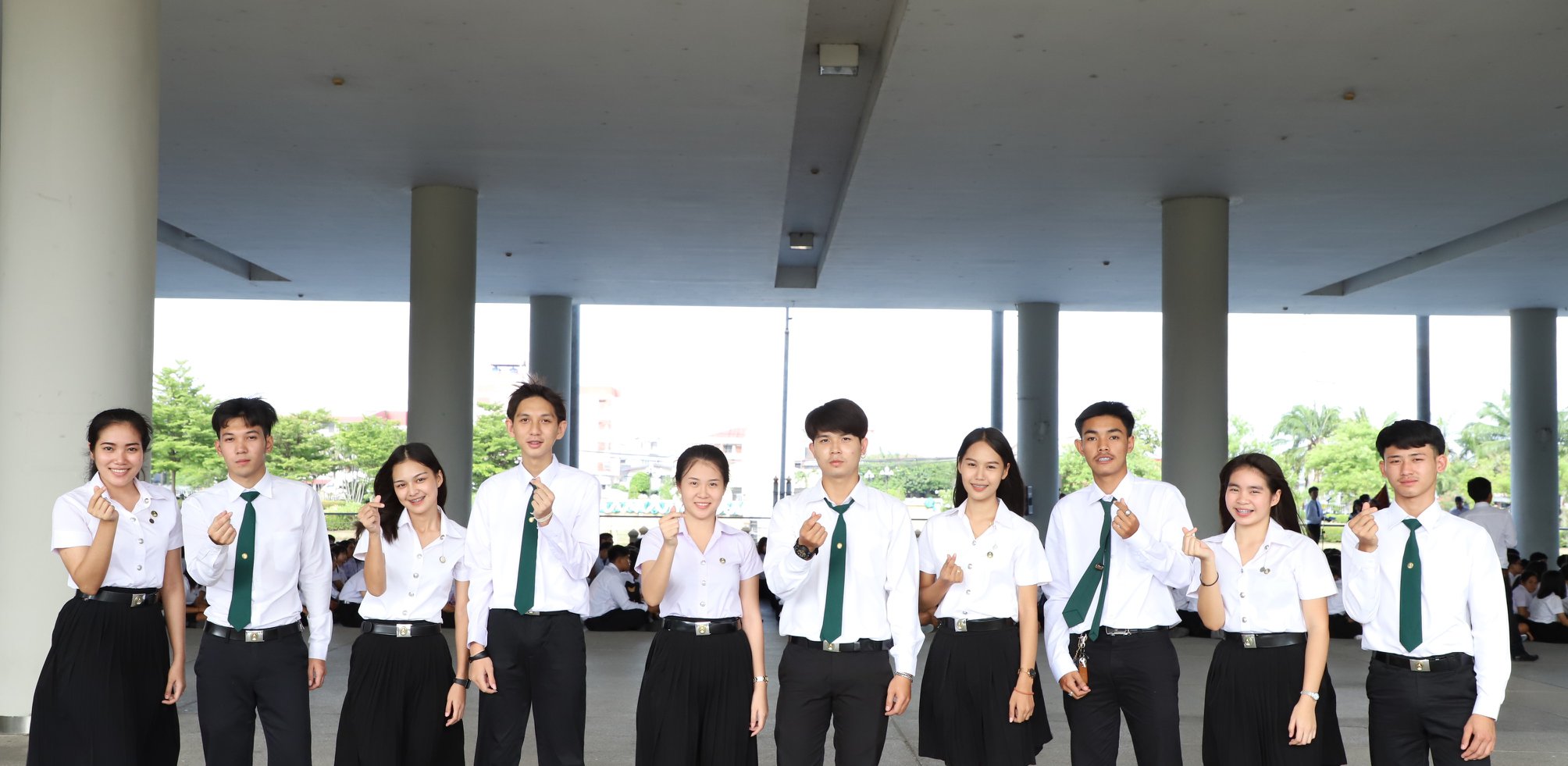
Responsible Consumption and production
17.2 Relationships to support the goals
17.3.12- Please indicate if your university publishes progress against SDG 12
Responsible Consumption and production (SDG 12)
12.2 Operational measures
12.2.1 – Does your university as a body have a policy on ethical sourcing of food and supplies?
VRU policies are focused on food providing throughout the supply chain with ethical and transparency as well. VRU concentrates from the procurement of raw materials for cooking to food quality transfer prior to customers. In order to cognizant of assigning food operators for control the ingredient qualities, selecting the suitable kitchenware and controlling the safety and quality of food containers, the University has well organized. VRU provides a variety food for all groups of people, including Halal food, vegetarian food, healthy food for their satisfaction for various foods with comprehensive services. Moreover, VRU has policy and management to control the suitable food prices within campus for food easiness accessible. Food qualities and safety of vegetables, fruits, foods and others are also focused. All canteens and cafes are monitored via the standards of the Ministry of Public Health. Food waste and food scraps are separated from other waste types at the source for use. The food waste and food scraps are fermented by anaerobic process to yield liquid fertilizers. These fertilizers can be used for grow crops to create the organic agricultural products without the use of chemicals. In addition, the biogas, as fuel has also been generated through the fermented process. VRU also has a policy to promote food waste reduction without leaving any leftovers that can directly inform to the shops. Moreover, the decreasing of single–use disposable packaging are focused and replaced by cloth bags. According to this policy, the waste from plastic bags and foam containers within the university have been monitored and all data have been collected. It has found that the amounts of both waste from plastic bags and foam containers have been reduced.
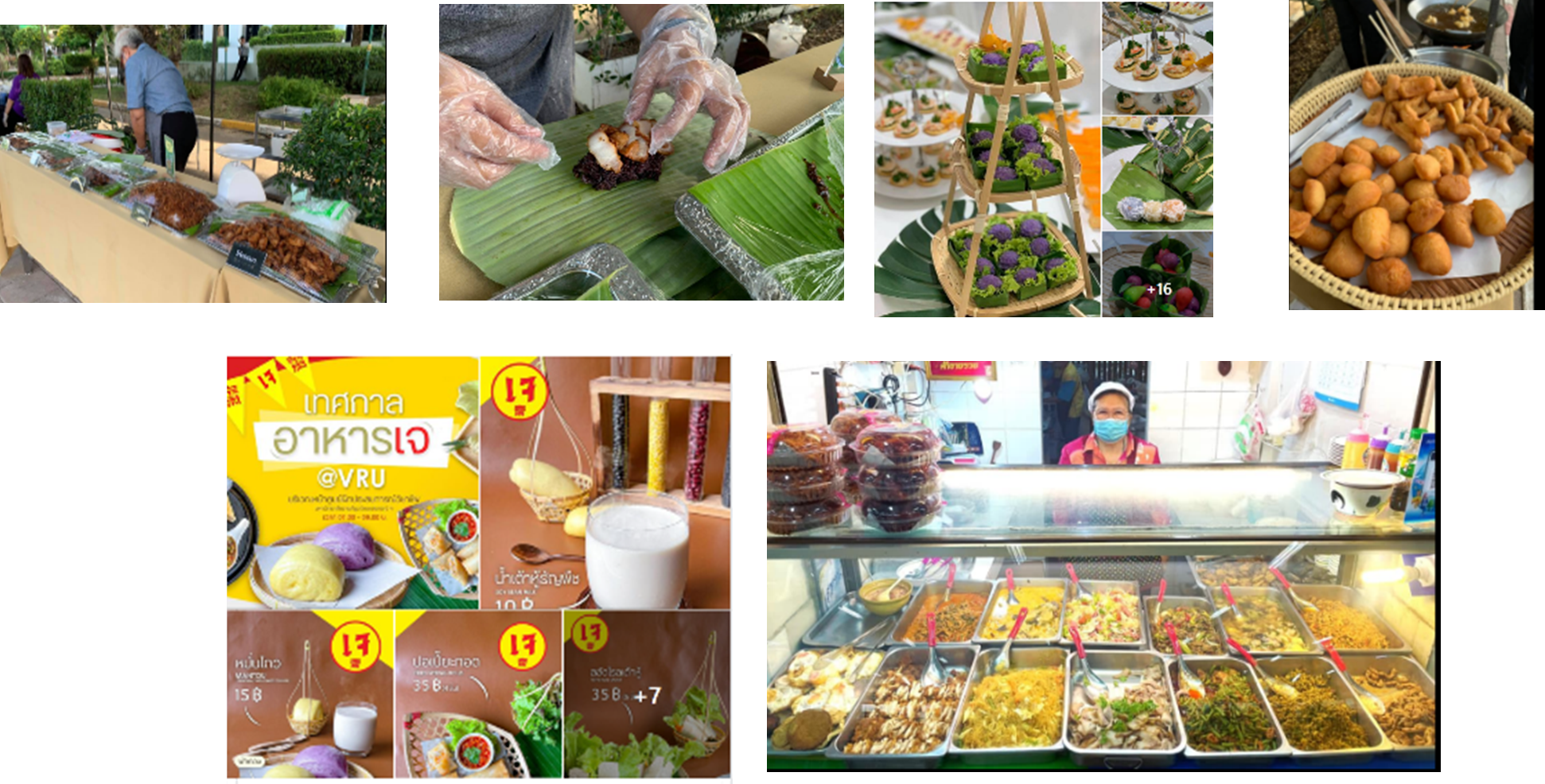
12.2.1 – Does your university as a body have a policy on ethical sourcing of food and supplies?
EVIDENCE 1 The Policy of Food Safety and Food Prices
VRU has implemented a policy to provide safe and affordable products for students, staff and visitors. For our process, the Office of Learning Promotion and Academic Services in the cooperation with the Property and Income provides for quality products with the affordable price produced from the Plant Genetic Conservation Project area and the community enterprise network groups. The university has variety of agricultural products from either in greenhouses or open spaces via natural process without the use of chemicals in all kinds of vegetables, fruits, and raising animals such as fish, chickens, etc.

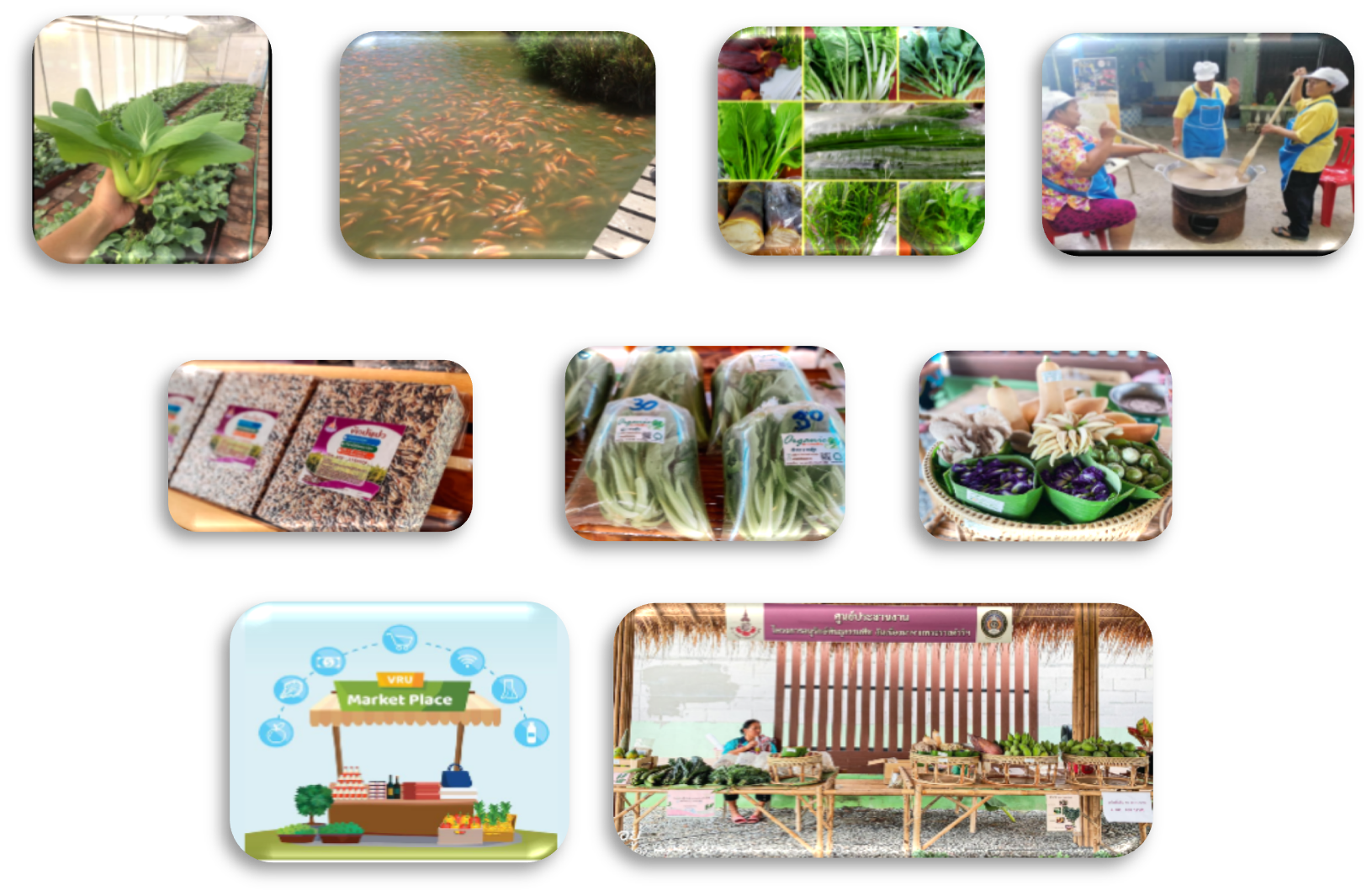
Evidence 2 The Policy of Solid Waste Separation
VRU has also focused on a policy to maximize the use of solid waste withing the university. Therefore, the cooperation of all parts of the university including shops and cafes are included. In the case of shops and cafes, the no leftovers from cooking such as vegetable scraps, fruit peels, eggshells, and other things are left without any benefit. The food scraps were separated by the customers using the provided waste containers and then these waste has been transformed via anaerobic fermentation to generate liquid fertilizers. These fertilized have been allowed for staff and student to grow crops or to use in their homes for organic productions. The produced Biogas can be use within the university canteens as well.
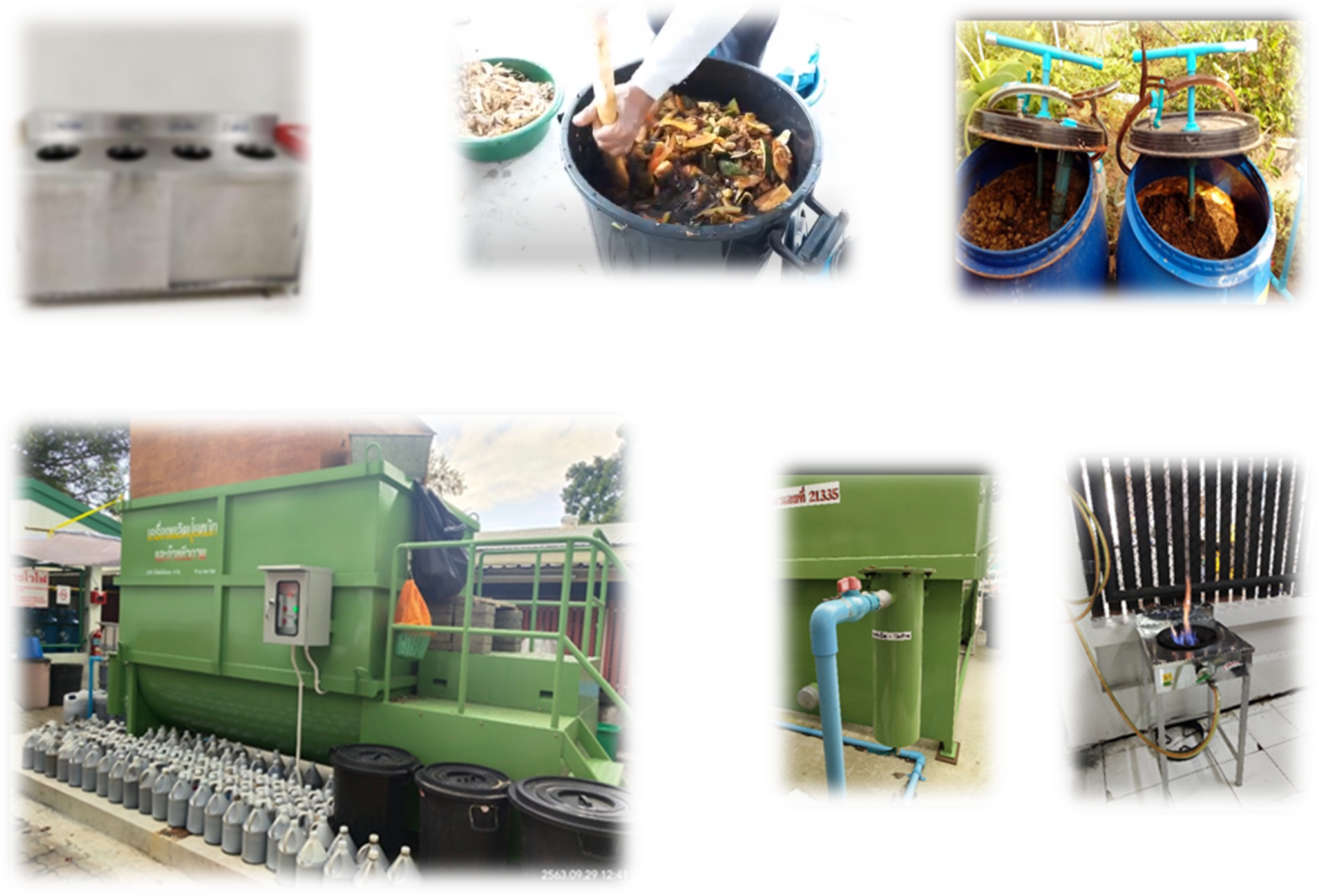
EVIDENCE 3 The Policy of the reduction of single–use packaging and No foam
VRU has strived to focus in the decreasing uses of single-use packaging and has also promoted the use of cloth bags to replace the use of plastic bags and to refuse the use of foam containers within the university. Due to the problems of plastic and foam waste, the management at the source is the most important problems. Therefore, the university has been working to reduce the use of single-use packaging since 2017 and encouraged the use of cloth bags to replace the use of plastic bags. In addition, the university has been distributed the knowledge of the awareness of single-use packaging to all university sectors. In 2020, The university has announced that foam containers for foods are forbidden because the foam containers are difficult to eliminate and the chemical in the containers is harmful and toxic at high temperature which can easily cause various disease. Therefore, the uses of biodegradable or natural materials are the proper alternative material for healthy. For the implementation, there are cooperation with many sectors in public relations and operations. Government involvement includes: Tha Khong Subdistrict Municipality Khlong Luang District Pathum Thani Province and the private sector is a think-thinking company. It owns an Ecolife application that collects single-use packaging consumption data and calculates the amount of carbon footprint that can be reduced.

Use biodegradable packaging made from natural materials

Banned from foam containers for food packaging and campaigned for reusable containers
12.2.3 Does your university as a body have a policy, process or practice on waste disposal – Covering hazardous materials?
Evidence 1 Upcycling waste
The university is concerned about Inorganic waste treatment. Therefore, the university has a plan to eliminate inorganic waste to reduce the amount of inorganic waste. Upcycling, this project encouraged using the waste for recycling, developing and creating the new products. It also promotes creative design and innovation from leftover resources. Besides, this process is safe for health and environment. Degenerated wheels and broken cement or sanitary wares were used for vegetable and ornamental plants garden decoration in special events. The expired computers, printers, copiers and other electrical appliance were sold back to the purchased company. Those participated in this activity were personnel, students, the general public.
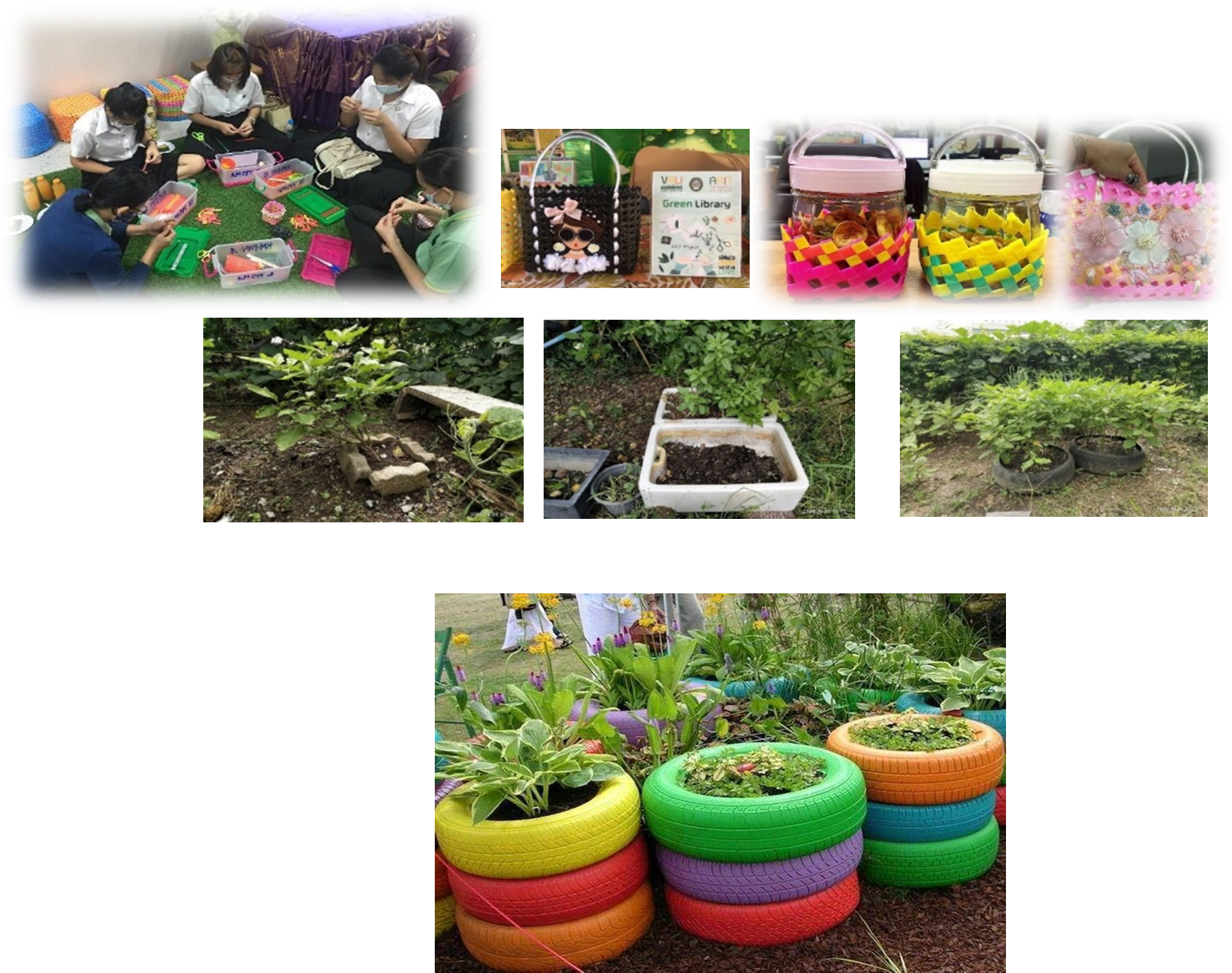
Evidence 2 Toxic waste treatment: The university divides the hazardous waste into two categories such as General waste: light bulb, battery, spray can, spray bottle and electronic appliances. Chemical waste: waste from reaction, expired chemical. General hazardous waste, this waste type was collected and waited for sending to a licensed company qualified for hazardous waste management every 3 months. The laboratory waste was classified according to chemical hazard. In addition, in collection, compatibility of chemical wastes also was considered. Finally, send all to a licensed company qualified for hazardous waste management every 6 months.
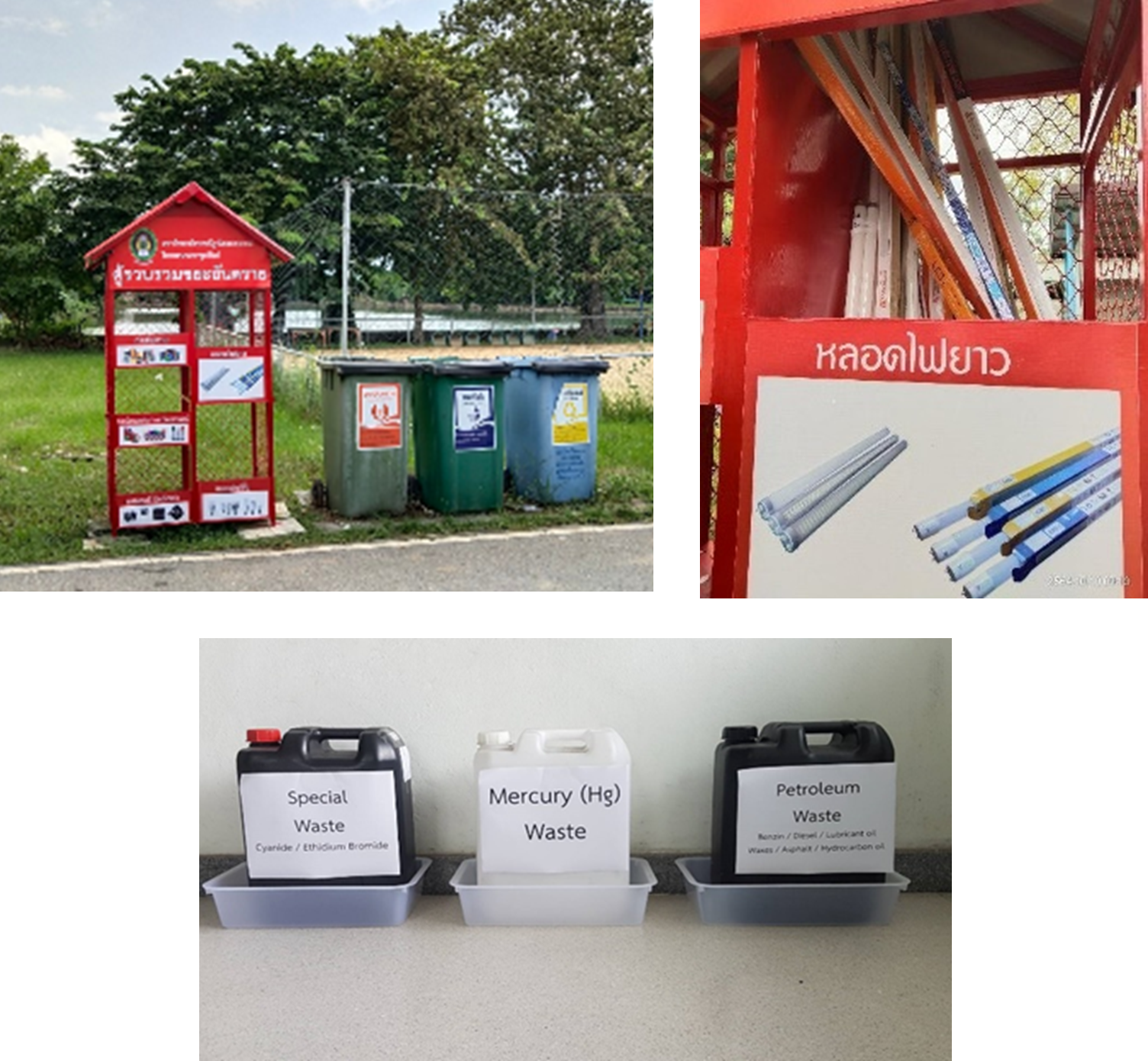
General hazardous waste and chemical hazardous waste collection
12.2.4 Does your university as a body have a policy on waste disposal – To measure the amount of waste sent to landfill and recycled?
Valaya Alongkorn Rajabhat University Under the Royal Patronage has a policy on monitoring the amount of solid waste that will be disposed of to landfill and recycle. In the past, the management of solid waste that occurred within the university would use landfill in empty space area. Later, the area was developed, the university began to set up a policy to monitor the amount of solid waste to be disposed of outside the university by contacting Pra Indra Racha Municipality, Phra Nakhon Si Ayutthaya Province. They are disposed of at a landfill in Bang Pa-In District. Subsequently, the municipality was unable to operate due to further urbanization. By the amount of solid waste that can be collected about 2 tons. The number of rounds reduced, effecting to a large amount of solid waste in the university. The impact of the university from the large amount of solid waste on campus requires systematic management. Establishing a garbage collection facility and monitoring the amount of solid waste of the whole university system. For the committees and agencies to monitor the amount of waste that occurs, they are classified into 4 types, namely biodegradable waste, plastic waste, general waste and hazardous waste.
Evidence 1 Establishment of the university’s collective solid waste collection facility
The university has established a solid waste collection facility. Prepare a building that can prevent rainwater from contaminating waste. In addition, a solid waste scale was installed to measure the total amount of solid waste generated by the university. Finally, all waste will be transported to the landfill by the Tha Khong municipality’s truck, Khlong Luang District, Pathum Thani Province.

Sampling to determine the composition of solid waste

Garbage accommodation buildings and solid waste scales
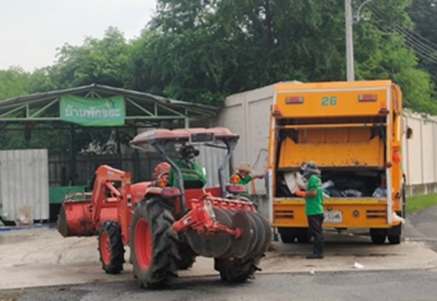
Collection and transport to the landfill by Tha Klong Municipality
12.2.5 Does your university as a body have policies around use minimization – of plastic?
EVIDENCE 1 The university has a policy to reduce the use of disposable packaging by switching to cloth bags to reduce the use of plastic bags and reject the use of foam containers.
The university has a policy of refusing to use foam containers on campus. Since the problem of foam waste is important to be managed at the source, the university has taken steps to reduce the use of single-use packaging and has been supporting the use of cloth bags to reduce the use of plastic bags since 2017. The university has publicized and educated to raise awareness by campaigning for entrepreneurs, personnel, students, and those who use the service continuously.
In 2020, the university announced a ban on styrofoam containers for food packaging. This is because styrofoam boxes are difficult to dispose of, and the substances left on the styrofoam containers when exposed to high heat can cause disease. Reusable or compostable containers made of paper or natural materials like banana leaves have also been advocated by the university.
Evidence 2 policy to reduce the use of single-use packaging Using cloth bags to reduce the use of plastic bags. Government involvement includes: Tha Khong Subdistrict Municipality, Department of Environmental Quality Promotion, and the private sector are Kid Kid Company. which owns Ecolife application. Daily data collection of single-use packaging consumption was conducted with a summary of data divided into groups and individuals. It is also calculated as the amount of carbon footprint that can be reduced by reducing the use of single-use plastics.
EVIDENCE 2 policy to reduce the use of single-use packaging Using cloth bags to reduce the use of plastic bags. Government involvement includes: Tha Khong Subdistrict Municipality, Department of Environmental Quality Promotion, and the private sector are Kid Kid Company. which owns Ecolife application. Daily data collection of single-use packaging consumption was conducted with a summary of data divided into groups and individuals. It is also calculated as the amount of carbon footprint that can be reduced by reducing the use of single-use plastics.
12.2.6 – Does your university as a body have policies around use minimization – of disposable items?
Valaya Alongkorn Rajabhat University under the Royal Patronage has a policy to reduce the amount of waste that must be disposed of by reducing activities that cause the amount of waste, such as reducing the amount of paperwork in the office by using electronic systems instead as well as the procurement of long-lasting items and workplace equipment that preserve energy.
Policy created on 2016
The university’s policy on reducing waste began in 2016. Initially, electronic systems were used in conjunction with teaching and learning management such as grades, thereby reducing the use of paper. In 2018, a 3D system for planning and reporting operations was created, which can decrease paper waste and document binding.
Policy reviewed on 2020
In 2020, more electronic systems for management within the university have been developed, enabling a significant reduction in the amount of paper waste. Moreover, from the epidemic of COVID-19, this has further stimulated the use of online document systems. The university has added many more operating systems for administration, including Payroll verification system to reduce slip printing, electronic table of contents system, human resources system for reporting operations and the budget reporting system for supplies and procurement, , for these reasons, has greatly reduced the amount of paper waste.
Evidence 1 Electronic Operating System
Reducing the amount of solid waste generated by the operating system to manage the university, including classroom management system project management system payroll check system human resources system for reporting operations and a reporting system for the budget of supplies and procurement.
12.2.7 – Do these policies extend to outsourced services and the supply chain?
Valaya Alongkorn Rajabhat University under the Royal Patronage has a policy of expanding ideas and practices to entrepreneurs and service providers for the university. Environmentally friendly raw materials and products must be utilized for the services provided by entrepreneurs to the university. The utilization of natural light and wind is emphasized in the design of buildings and sites. Construction activities must adhere to safety regulations as well as energy-saving construction requirements. In addition to the construction, other operators, such as goods carriers, will choose containers that are environmentally friendly, such as using containers made of biodegradable materials and solid waste classification.
12.2.8 – Do these policies extend to outsourced suppliers and the supply chain – (suppliers of equipment, stationary, building contracts)?
Valaya Alongkorn Rajabhat University under the Royal Patronage has a policy for partners as well as the supply chain to manage the product to the waste that occurs in the selection of durable articles, equipment, and contracts as well as the construction to be carried out with responsibility for the products and services that occur.
Environmental Friendly Policy
Valaya Alongkorn Rajabhat University under the Royal Patronage has a policy of buying clothes in Coolmode, in which the label is created by a collaboration between the Institute of Textile Industry Development and the Greenhouse Gas Management Organization (a public organization).
This product has special features to absorb sweat and heat well, making it comfortable to wear, not stuffy, and it can be worn in buildings or rooms with air conditioning temperature 25 degrees without feeling uncomfortable. The university received an award organized by the Electricity Generating Authority of Thailand together with the Greenhouse Gas Management Organization (a public organization). This university is therefore an organization to reduce global warming by using CoolMode clothing because the staff uniforms are used as CoolMode fabrics, which are the advantages of clothing. This CoolMode also reduces global warming and reduces the use of electricity for air conditioners, as well as reduces both direct and indirect greenhouse gas emissions.

12.3 Proportion of recycled waste: 2019
12.3.1 – Does your university as a body measure the amount of waste generated and recycled across the university?
The university has a waste management system that involves bringing the garbage to the same point, resulting in the collection of data on the rate of solid waste for the whole university. This, along with the separation of the composition of the solid waste that occurs, found that organic waste, or biodegradable waste, is the largest, accounting for 58.3% of total waste as it consists of food scraps, leaves, and twigs. The second largest group of waste was paper from the office, teaching and other activities, and the plastic waste group consisted of plastic bags and packaging. Due to the COVID-19 situation, many shops do not accept reusable containers, which causes the amount of plastic to increase. The university’s 2021–2022 operation has partnered with TPBI Public Company Limited to organize the “Won Project“ activity, where clean stretch plastic is donated to produce robes for monks and some is used for oil production. The university has established a waste bank in collaboration with the Department of Environmental Quality Promotion, the Department of Environmental Quality Promotion, and private companies that come to buy waste that can be recycled. This makes the operation of waste sorting for recycling that much greater.
12.3.2.1 – Amount of waste generated 181.95 MT
12.3.2.2 – Amount of waste recycled 18.11 MT
12.3.2.3 – Amount of waste sent to landfill 163.84 MT
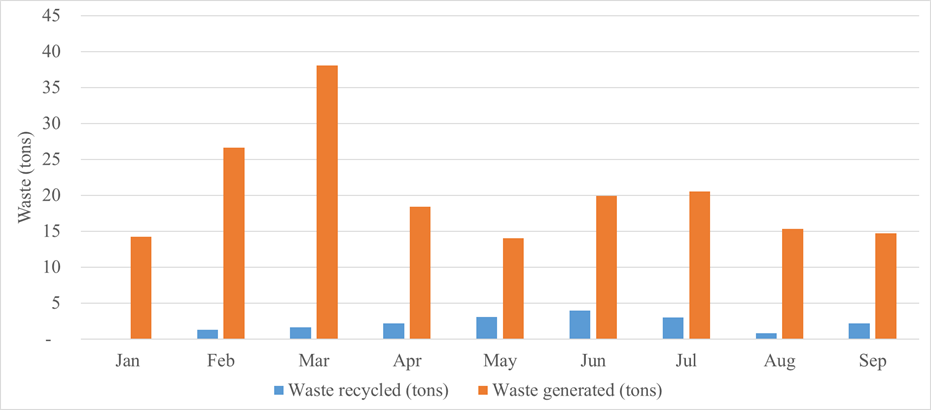
The bar graph shows a comparison of the rate of waste generated with recycled waste.
“Won Project” “Won” in Thai means circular, we then decided to name this project as “Won” which shall always remind us to use plastic to be in line with circular economy concept. “Won” Project welcomes all clean plastic bags and plastic film. We are pleased to recycle plastic bags and plastic scrap so that they are reproduced and reused, and we, therefore, could reduce plastic trash to be disposed.

“Won Project”
Recycling program for university’s waste
The university has the intention to promote all staffs, students and including visitors to aware the importance of waste management, recycling and resource consumption. Therefore, the university encouraged all to join the many relevant activities.
The “Recycle Bank”
This project is a recycling waste disposal project. All parts in the university collected the recycle waste to sell to the bank and return will be kept in an recycle account book. The recyclable waste will be sold to the dealers for processing into reusable materials. Recycle Bank deposits can be separated to 4 types such as papers, glasses, metals and plastics.
The waste deposit criteria are
- bring the recycle account book when coming to deposit,
- account can’t transferable to others except with the consent of the bank,
- balance moneys in account must not be less than 50 baht,
- withdrawing can be made when the money in account are over 100 baht,
- 1 kg minimum weight for each deposit and
- First time opened an account must have a 1 kg minimum weight deposit and can withdraw in the next time. The photos show an example of recycle account book, the saleable wastes and waste sorting station for recycle bank.
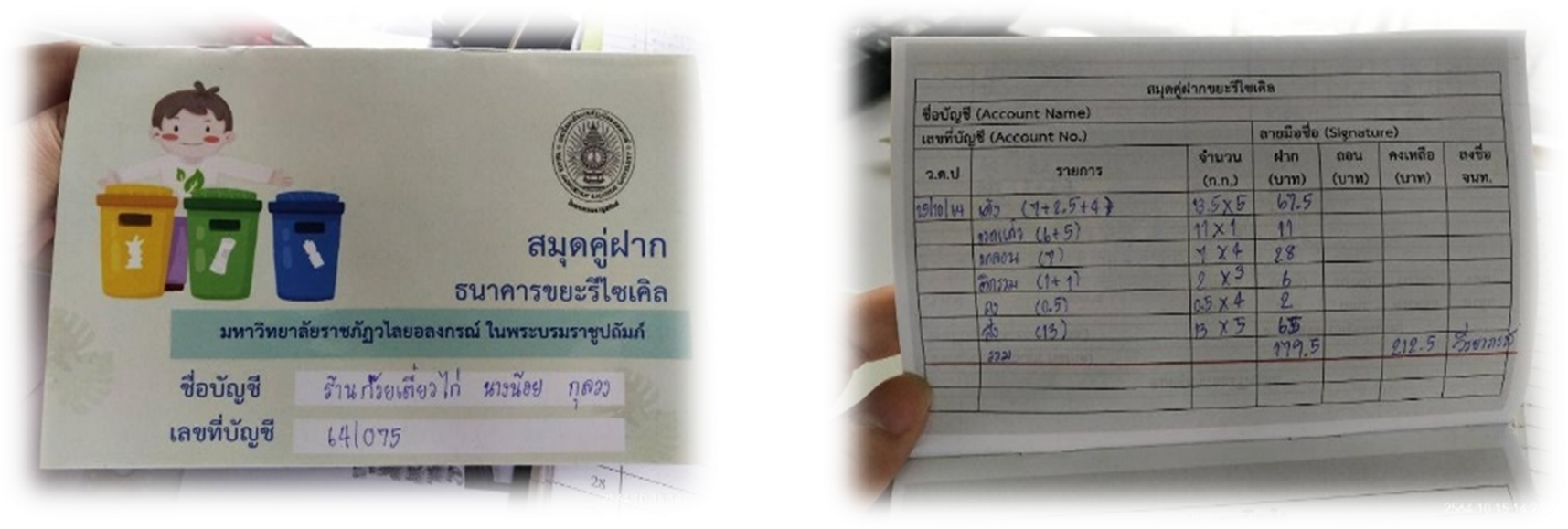
Recycle account book of VRU
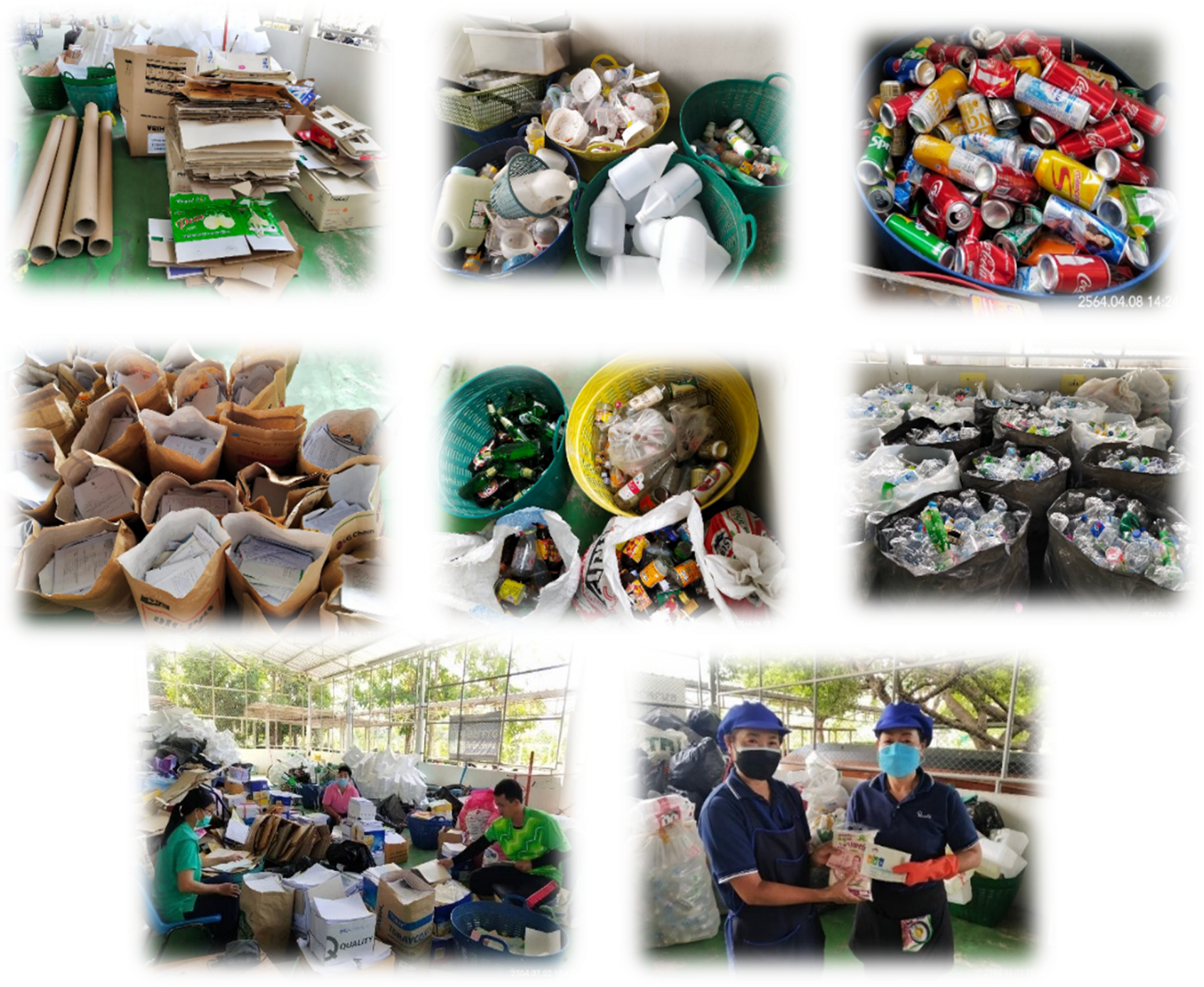
Waste separation campaign in VRU


